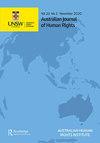脑损伤与监狱:过度代表、预防和改革
Q1 Arts and Humanities
引用次数: 1
摘要
在世界各地的监狱中,脑损伤患者的比例明显过高。与普通人群相比,监狱里的人患脑损伤的可能性是普通人的五倍多。脑损伤可能有多种持续症状,导致犯罪行为和辩护不足。警察、律师、法官和监狱工作人员大都不知道囚犯的脑损伤状况。对这一未得到承认的流行病的沉默往往导致治疗不足和不必要和不适当的纪律处分。从有过严重创伤性脑损伤的人的角度来看,我建议对囚犯进行更系统的筛选,并修订对警察、律师、法官和监狱工作人员的培训。与囚犯打交道的人应该接受培训,学习如何识别和处理脑损伤造成的缺陷。人权诉讼也可能是满足脑损伤囚犯需要的一种工具。有脑损伤的人不应该被惩罚和遗忘。本文章由计算机程序翻译,如有差异,请以英文原文为准。
Brain injury and prison: over-representation, prevention and reform
ABSTRACT People who have suffered a brain injury are significantly over-represented in prisons around the world. Compared to the general population, people in prison are more than five times as likely to have had a brain injury. Brain injuries may have multiple ongoing symptoms which lead to the commission of criminal offences and to inadequate presentation of defences. Police, lawyers, judges and prison staff are largely unaware of an inmate’s brain injury status. The silence of this unrecognised epidemic frequently leads to insufficient treatment and unnecessary and inappropriate disciplinary action. From the perspective of having had a severe traumatic brain injury, I recommend more systematic inmate screening and revision of the training given to police, lawyers, judges and prison staff. People who deal with prisoners should be trained in how to identify and manage the deficits caused by brain injury. Human rights litigation may also be a tool to meet the needs of brain injured inmates. People with brain injuries should not be punished and forgotten.
求助全文
通过发布文献求助,成功后即可免费获取论文全文。
去求助
来源期刊

Australian Journal of Human Rights
Arts and Humanities-History
CiteScore
1.30
自引率
0.00%
发文量
43
期刊介绍:
The Australian Journal of Human Rights (AJHR) is Australia’s first peer reviewed journal devoted exclusively to human rights development in Australia, the Asia-Pacific region and internationally. The journal aims to raise awareness of human rights issues in Australia and the Asia-Pacific region by providing a forum for scholarship and discussion. The AJHR examines legal aspects of human rights, along with associated philosophical, historical, economic and political considerations, across a range of issues, including aboriginal ownership of land, racial discrimination and vilification, human rights in the criminal justice system, children’s rights, homelessness, immigration, asylum and detention, corporate accountability, disability standards and free speech.
 求助内容:
求助内容: 应助结果提醒方式:
应助结果提醒方式:


